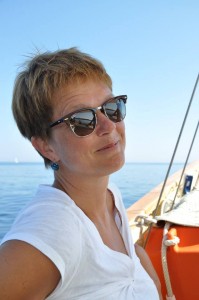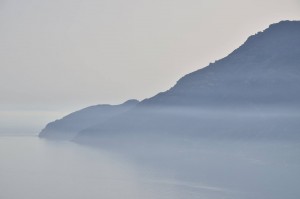I’m a little out of practice. It’s been a long time since I wrote love letters and I certainly don’t have any experience making my love public. But now I have to do it. I’ve been in love for a long time and now the moment has come for me to publicly declare myself, confess to her and stand with her in the marketplace. I say YES to Ikaria – Yes to Ikaria, mon amour.
Nowadays you can fall in love with many and many things, you can enter into a life partnership in a variety of ways. I have decided to love an island – and a Greek one at that – fiercely and deeply. I believe this is a love that I no longer want to part with, a love that will carry me a long way, a love that will nourish me – even in dark and bad days.
No, now is not the time to feel my hot forehead and worry about calling the doctor. Rather, it’s time to go to Google maps and search for the island. Although my love is well known in some circles, it still likes to hide from others. If you add the term “Ikaria – blue zone” to Google, then you have a good chance of discovering Ikaria. There you will learn that the island is located in the Aegean Sea, near Samos, has 3,000 inhabitants and is famous for many things: its local festivals, the longevity of its inhabitants, its somewhat bizarre lifestyle. It’s all written down very nicely and the pictures are wonderful too. But it doesn’t adequately describe my love. Ikaria is a holistic experience. I have to smell, touch, hear, taste, see Ikaria – and only when I have regained those senses can I begin to describe the island a little. But in which language? Which language gives me the sufficient vocabulary – the powerful words and the subtle words – to describe my love? The languages I speak do not seem sufficient to me, perhaps only Greek can be the all-encompassing language, but so far I speak it only inadequately. So, how to start? Maybe best with my basic feeling:
Ikaria is my antipode. The island, the people there, the life – many things are the absolute opposite of my everyday life, my upbringing, my socio-cultural background. I am German, grew up in North Rhine-Westphalia and lived for a long time in Potsdam, the most Prussian city of all German cities. That shapes. And then in 2006 I accidentally landed on the island of Ikaria, more precisely in Agios Kirikos. Looking back, it was fate and I owe this turning point in my life to a smart woman on Lesbos. I asked her which island she could recommend for my onward journey. She looked at me long and calmly and then said: “Ikaria”. I would like to know what she saw in me back then…
In any case, I ended up there and my first trip took me to the Kafenion “Casino”, which at that time still had a typical Greek outfit. I sat there for hours sipping my coffee and was completely disoriented. All around me were wild guys with long beards, long hair and dark sunglasses, talking loudly. Old people who came to this small town, more like a collection of houses, on their mopeds, went about their business and then ended up in the Kafenion. Young people, equipped with sleeping bags and backpacks, colorful clothing, trying to get to the other side of the island by hitchhiking. I felt like I had been beamed into another cosmos whose rules I didn’t understand. I had conflicting feelings: leave immediately or stay longer. My curiosity won. I found a hotel and since I take a lot of photographs, I wandered around the island with the camera. We felt our way towards each other. We were very suspicious of each other. People were suspicious of me: there was a woman walking alone, constantly taking photos and obviously she doesn’t belong to any man here. I was suspicious of people because they often looked so dark and it always took a bit of effort for me to talk to them. But at some point the ice began to melt. We got used to each other. In the “Casino” they soon knew how I drink my coffee: double Greek coffee, black and unsweetened. I dared to approach people and ask for the opportunity to take a photo. Because there are “real faces” on the island. Many people were flattered and we started talking. So I learned a lot about people’s life stories – the stories behind the wrinkles and the toothless mouths. And the more I sat with these people, drinking coffee or Ciepero, the more impressed I was. There were and are stories of courageous and self-confident people who at some point – when there was no longer any possibility of earning money on the island – took the duffel bag and set off for America, Australia or Canada and made a living in all kinds of jobs . People who came back because the island called them. The island with its rough coasts and hidden beaches, with this indescribable play of colors of the sea in the evening sun. The island with its own time rules, its calm, even rhythm. The island with its wildness and all-encompassing love of life, which is perhaps best captured by dancing the Ikariotiko at a village festival, a panagyria.
These stories, but especially my own experience of the silence and community on the island, touched me deeply inside. In the first year I couldn’t define exactly what happened. I just knew I had to go back there. I wanted to learn more because I knew that if I learned more about the island, I would also learn more about myself. So I came again. Every summer, always for a short time, I absorbed the taste and smell, enjoyed the festivals, recharged my life energy… and then I was gone again. I thought that I still had to get to know other islands and places and therefore only gave Ikaria a little time. For a few years I didn’t come at all. I’ve lain on other beaches, heard other people’s stories, but there was always this longing. Only sometimes did I allow the inner questions: what the hell am I doing here? Why am I sitting here and not on Ikaria? I came back in 2012. I cautiously made contact with the people again; they still remembered me and asked in astonishment: where have you been all this time? I set off again with the camera and stopped in the middle of the coastal road to enjoy the intense and typical scent of the island. Each time I was able to breathe deeper and more freely. Each time I was able to laugh more freely. Each time I felt more alive. And last year I suddenly knew: I wanted more of it. I don’t want anything else now. I want to dig deeper. I want to capture this island holistically, not just this summer-sun tourist side in August. I want to know how she lives in the autumn storm, I want to explore her beauty in winter, I want to know how she welcomes spring. So I gave my love time and space. I rented a small apartment in Agios Kirikos and now I come more and more often. I can’t fully commit to her yet, I still don’t have the courage to do so, but I’ve decided on her. I have pursued my love many times in my life. But this time it’s different. There is this calm understanding that we will take our time with each other, that we will not bend each other, but that we will engage with each other in the rhythm of the island. This is really challenging. I’m always excited when I visit her. The heart is pounding and the head is racing. How will she receive me? Am I up to it – its cold and the rain in winter, the loneliness on the long, dark November evenings when no locals come to the door? Can I endure the hustle and bustle when my favorite places are overcrowded in the summer months and I hardly have any places to retreat to? So far I can do it. It’s not easy. My love presents me with great challenges, but it enriches me infinitely. I grow together in her arms, she is my best medicine and patient teacher. It brings me back to nature, it teaches me the natural rhythm of life, it teaches me deep joy when I see old and young people dancing together during a panagyria – love and joy of life in the here and now. In these moments I know: I don’t need much, I need – Ikaria, mon amour.
Birgit Urban


